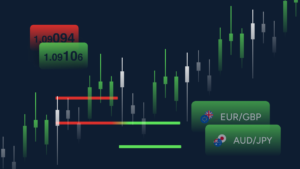Among all the financial trading deals, forex trading is one of the most popular in the modern world. The liquidity of the forex market is very high, with over $6 trillion traded daily, providing immense opportunities for profit. However, forex trading can be complex, especially for beginners.
In this article, we provide essential tips and strategies for trading foreign exchange (Forex) to improve your chances of success in such a dynamic market.

Understanding the Forex Market
The forex market is the largest and most liquid financial market globally, where currencies are bought and sold against each other. Unlike other financial markets, forex trading takes place 24 hours a day, five days a week, across various time zones, making it accessible to traders worldwide.
A forex quote describes the price of a currency pair, which involves two different types of currencies. For instance, in the EUR/USD pair, the EUR is the base currency and the USD is the quote currency. Buying or selling involves currency pairs based on expectations of how exchange rates will change.
Why Trade Forex?
There are several reasons why traders find the forex market attractive. Key benefits include:
Liquidity:
The forex market is the most liquid in the world, with buyers and sellers ready to trade at all times. This liquidity ensures that traders can enter and exit the market quickly, often at optimal prices.
Leverage:
Forex trading offers high leverage, allowing traders to control larger positions with smaller capital. While leverage can increase profits, it also magnifies risks, so it must be used wisely and cautiously.
24-Hour Market:
Forex trading is available anytime, anywhere. This flexibility allows traders in different time zones to participate in the market, whether they are day traders or those who prefer to trade during specific hours.
Low Transaction Costs:
Forex brokers typically offer tight spreads, making transaction costs minimal compared to other markets. This makes it an attractive market for traders seeking cost-efficient trading opportunities.
Diversification:
The forex market allows traders to diversify their portfolios by exposing them to global currencies and economic conditions, potentially reducing risks and improving returns.
Essential Tips for Success in Forex Trading
While forex trading offers significant opportunities, it also involves risks. To succeed, traders must follow essential principles and strategies. Here are key tips for success in forex trading:
Educate Yourself Constantly:
Education is crucial for success in forex trading. The market is dynamic, and traders must stay informed about the latest economic news, trends, and trading strategies. Use free educational resources provided by brokers, read books about forex trading, follow financial news, and join online forums or trading communities.
Develop a Trading Plan:
A well-structured trading plan is essential in forex trading. Your plan should outline your objectives, risk tolerance, strategy, and money management rules. Stick to your plan and avoid making impulsive decisions based on emotions or short-term market movements. Long-term success requires discipline and consistency.
Use Technical and Fundamental Analysis:
Forex traders use both technical and fundamental analysis to make informed decisions:
- Technical Analysis: Involves studying price charts, patterns, and technical indicators to predict trends. Popular indicators include moving averages, Relative Strength Index (RSI), and Fibonacci retracement levels. Technical analysis helps identify entry and exit points.
- Fundamental Analysis: Based on economic factors that affect currency prices, such as interest rates, GDP growth, inflation, and geopolitical events. Understanding a country’s economic background helps predict currency movements.
Manage Your Risk:
Risk management is the most crucial aspect of forex trading. Protect your capital by using stop-loss orders to limit losses in case of a bad trade. Successful traders recommend risking no more than 1–2% of your account balance on a single trade.
Consider proper position sizing and always evaluate the risk-to-reward ratio before entering a trade. A good rule of thumb is to aim for a 1:2 risk-to-reward ratio, meaning for every dollar you risk, aim to make at least two dollars in profit.

Focus on a Few Currency Pairs:
Instead of trading every currency pair, focus on a select few that you understand well. Major currency pairs tend to be more stable and provide predictable trends, making them easier to analyze. This will give you a deeper understanding of their movements and improve your trading accuracy.
Use Leverage Carefully:
Leverage can amplify both profits and losses. High leverage is tempting for beginners but should be used cautiously. Start with lower leverage and increase it as you gain more experience. Never trade with money you cannot afford to lose.
Be Patient and Avoid Overtrading:
Forex trading can be fast-paced, but successful traders know the importance of patience. Overtrading due to greed often leads to poor decisions and excessive losses. Stick to your trading plan, wait for high-probability setups, and avoid impulsive trades.
Keep a Trading Journal:
Maintaining a trading journal helps improve your forex skills. Record every trade, the reasoning behind it, the strategies used, and the results. Regularly reviewing your journal helps identify patterns, strengths, and weaknesses in your trading, allowing you to adjust your strategy accordingly.
Stay Emotionally Detached:
Trading can be emotionally taxing, especially during volatile periods or after a string of losses. Stay composed and avoid making emotional decisions like revenge trading or trading out of fear. Emotional decision-making can lead to poor judgment and significant losses. Train yourself to follow a programmed and disciplined approach.
Keep Learning and Evolving:
The forex market is constantly changing. What works today may not work tomorrow, so it’s important to refine your strategies, learn from mistakes, and adapt to new market conditions. Commit to continuous improvement, whether by experimenting with different technical indicators or understanding broader economic trends.
Common Errors to Avoid in Forex Trading
To become a successful forex trader, learn from others’ mistakes. Common errors to avoid include:
- Overleveraging: Using too much leverage can lead to major losses. Always align your leverage with your risk tolerance and trading plan.
- Chasing the Market: Impulsive trades due to fast-moving markets are risky. Wait for a proper setup based on your strategy.
- Ignoring Risk Management: Failing to use stop-loss orders or risking too much on a single trade can lead to significant losses.
- Lack of a Trading Plan: Trading without a strategy or clear objective leads to emotional, unplanned decisions.
- Overtrading: Forcing trades when the opportunities aren’t clear can result in losses. Be selective with your trades.
Frequently Asked Questions – Forex/Currencies!
What are the best tips for mastering Forex Trading?
Focus on developing a solid strategy, managing risks, studying market trends, practicing patience, and continually learning from your trades.
How long does it take to master Forex trading?
It can take several months to years to master Forex trading, depending on the time you dedicate to learning, practice, and refining your strategies.
What is the role of technical analysis in Forex trading?
Technical analysis helps traders predict future price movements based on historical data, charts, and patterns, which is essential for identifying entry/exit points.
How do I select the right currency pairs to trade?
Focus on currency pairs with high liquidity and volatility, such as EUR/USD or GBP/USD. Analyze market conditions and economic news to make informed decisions.
What mistakes should I avoid in Forex trading?
Avoid overleveraging, ignoring risk management, failing to adapt to market conditions, and being influenced by emotions or unrealistic expectations.
How can I stay disciplined in Forex trading?
Stick to your plan, set achievable goals, manage risk effectively, and avoid getting emotionally involved in your trades by focusing on long-term objectives.
Conclusion
Forex trading offers tremendous opportunities but requires knowledge, discipline, and strong risk management practices. By following the tips outlined in this article, you can increase your chances of success while avoiding common pitfalls. Remember, forex trading is a marathon, not a sprint, and long-term profitability relies on consistency, patience, and continual education.
Start small, keep learning, and refine your approach as you gain experience. With the right mindset and strategy, you can navigate the complexities of the forex market and achieve your trading objectives.
Table Of Content
Recent Posts
- Top 10 Commodities

- Top 5 Forex Trading Strategies for Consistent Profits in 2025 (All You Need to Know)

- Day Trading vs. Position Trading in Commodities: Which Strategy Works?

- Best Crypto Trading Strategy in 2025: Learn How to Trade Cryptocurrency in 5 Easy Steps!

- The Role of Technical Indicators in Trading: Enhancing Your Analysis


